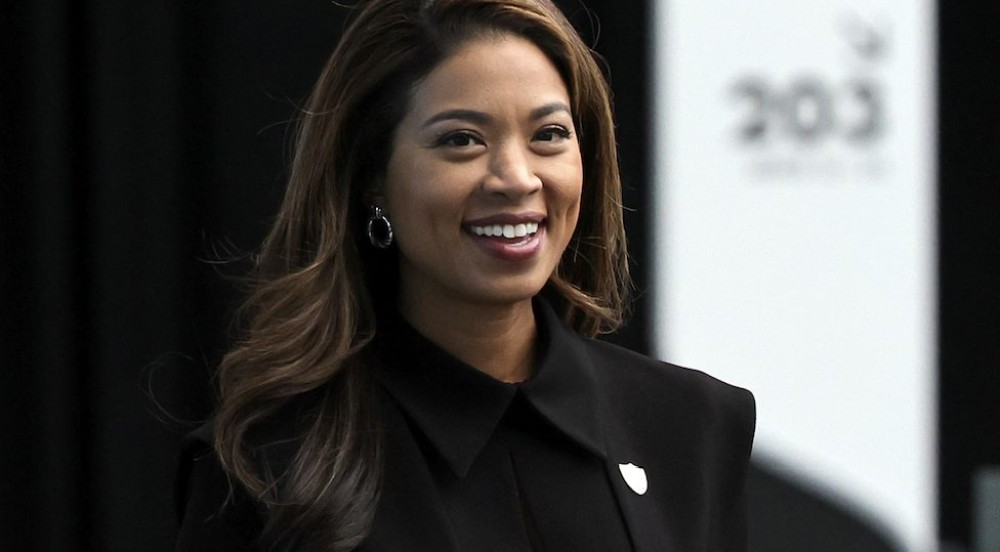The Las Vegas Raiders in hiring Sandra Douglass Morgan as team president and the NHL’s San Jose Sharks hiring Mike Grier as General Manager were both steps in the right direction for diversity. But let’s not confuse progress with substantive change, with the latter still lacking when it comes to Black and Brown leadership in professional sports.
Progress is not in enhancing what is, but in advancing toward what will be.”
Those are the words of Lebanese writer and poet Khalil Gibran written decades ago, words that still ring true today.
They hit a particularly high note in the world of professional sports which for many, saw significant progress recently with recent hires in the NHL and NFL, respectively.
Former NHL player Mike Grier was hired as the San Jose Sharks General Manager, the first time in league history that a Black man held that position.
And on the NFL side of things, the Las Vegas Raiders made history with the hiring of Sandra Douglass Morgan as team president, the first time an NFL team ever hired a Black woman to serve in that capacity.
Both were historic gestures that deserve to be praised for a wide assortment of reasons.
But as much as those organizations should be credited for what they’ve done, let’s not pretend as if all is good in the world of pro sports and diversity.
While the NFL has certainly made its share of moves toward diversity, the wheels of change continue to move at a snail’s pace when it comes to Black and Brown people in positions of leadership, especially when it comes to Black women.
It was fitting that the Raiders would be the first to hire a Black woman in this role considering they have been the standard-bearers when it comes to diversity and NFL-firsts.
The Raiders were the first NFL team during the modern era to hire a Black head coach (Art Shell; 1989) as well as a female chief executive (Amy Trask; 1997). On the field, Raiders’ Hall of Famer Tom Flores was the first Mexican quarterback in pro football history (1960) in addition to being the first minority coach to win a Super Bowl (he did it in 1980 and 1983 with the Raiders).
The NHL remains the professional sports league that has consistently lagged behind the others when it comes to diversity among fans, players and executives, despite being among the oldest professional sports leagues.
So it is no surprise that the league has been woefully inept when it comes to leadership that involves Black and Brown people.
Diversity at its essence is uncomfortable and often involves a head-on collision between the ugly realities of the past, and the need for change going forward. .
It can be painful.
It can be messy.
And it can be slow coming to fruition.
Which is why the recent hirings in Las Vegas and San Jose, while noteworthy, serve as reminders of how easily we confuse progress with change, treating them as if they are different colored earbuds.
What we’re seeing with those two teams in those leagues, is progress.
The Raiders have a highly qualified executive in Morgan whose body of work on its own merit, would make her a finalist for just about any comparable position available. Throw in the fact that she’s a Las Vegas native, and her in this role with that resume—it was a no-brainer.
But what does that do for what diversity is intended to do, which is bring about change that better reflects the world around us?
The same goes for Grier on the hockey side of things.
His hiring is no question a step in the right direction.
But how much farther along the road of diversity does this put the NHL, the last of the four major professional sports leagues to have a Black General Manager?
That’s why the excitement behind both hires has to be tempered a bit.
We’re at a point in time when we need to see more substantive change when it comes to diversity within professional sports leadership.
As Gibran noted decades ago, progress has to be more than just an enhancement, but rather, a clear advancement that takes us not where we need to go but where we need to be.
Professional sports leagues are good at delivering on the promise that progress brings.
But making significant change when it comes to leadership for qualified, Black and Brown people?
That continues to be the deferred dream for those who champion diversity, and are left with nothing but crumbs of progress that will never satiate the appetite for those of us who want substantive change that can only come about when leadership better reflects the product on the playing field and in the stands.













